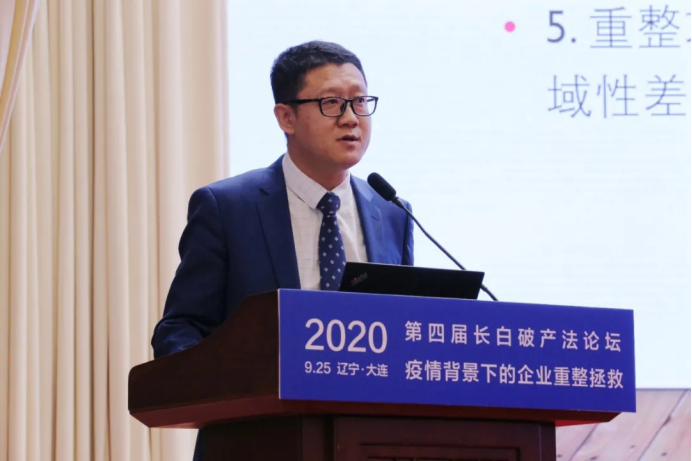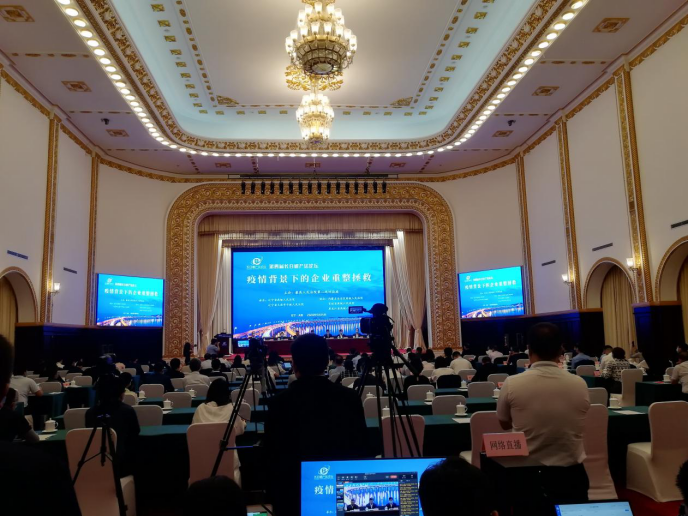“The 4th Changbai Bankruptcy Law Forum” was held in Dalian, Liaoning Province on 25 September. The forum was hosted by the Second Circuit Court of the Supreme People’s Court, undertaken by Liaoning Higher People’s Court and Dalian Intermediate People’s Court, and co-organized by Inner Mongolia Autonomous Region Higher People’s Court, Jilin Higher People’s Court and Heilongjiang Higher People’s Court. More than 120 people, including judges, representatives of the National People’s Congress, experts and scholars from universities, bankruptcy law research society, bankruptcy administrators association and law firms attended the forum. In addition, 9 media outlets including Xinhua News Agency, People’s Daily, Legal Daily, People’s Court Daily, First Financial News, Liaoning TV Station, Liaoning Legal Newspaper, Dalian TV Station and Dalian Radio Station were also invited. The forum was live-streamed online and reported. Professor Qi Ming from Jilin University School of Law was invited to attend the conference and give a keynote speech.
The theme is “enterprise resumption in the context of the pandemic”, and the sub-topics are “interaction between bankruptcy frontier and government and hospital” and “application and improvement of reorganization system”. Professor Qi Ming gave a speech, which is titled “Actively Implementing the interaction between Government and Institution to Stimulate the Function of Bankruptcy Reorganization”. He focused on the functional analysis of bankruptcy reorganization, the proposal and implementation of the interaction between government and institution, the boundary of the interaction between government and institution, and the stimulation of the reorganization function through the interaction between government and institution. Based on the bankruptcy law theory, Qi’s speech made in-depth thinking to provide new ideas for the development of theory and practice concerning the epidemic background and the new development of bankruptcy law.
Professor Qi pointed out that there is a big gap between the function and the original expectation of the actual operation of bankruptcy reorganization system. Factors including the natural conflicts among creditors, debtors and social public interests, the misunderstanding of seeking to achieve the goal of survival of the fittest in individual cases, the insufficient ability of the current legislation to limit bankruptcy fraud, and the regional differences in external markets and economic environment, partly limit the function of reorganization. At present, the model of government-hospital interaction has a positive role in optimizing the market competition mechanism, but the problem of administrative intervention requires further exploration. Therefore, it must be made clear that the boundary of government-hospital interaction neither affects the market mechanism, nor exceeds the legitimacy standard. It is not applicable to enterprises that are not worthy of reorganization. To promote its function, the model of government-hospital interaction should be applied according to law. The government needs to create a helpful external environment for the model to play a more important role in the reorganization of special industries.
In the essay contest of this forum, Guo Xiangling, a postgraduate majoring in civil and commercial law from Jilin University, won the third prize with her paper “Analysis of the nature and legal path of the exit mechanism of debt-to-equity swap of commercial banks-in the context of bankruptcy reorganization”.
Professor Qi is devoted to the academic and practical research with close attention to the frontier in the field of bankruptcy law at home and abroad. He focuses on the brand-new concepts of bankruptcy law and advocates the idea of reviewing bankruptcy cases according to law. Through discussion with participants at the forum, judicial theory of socialism with Chinese characteristics is further promoted and contributes to the double first-class construction of School of Law.

